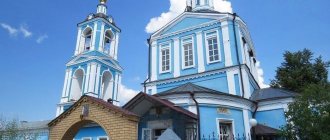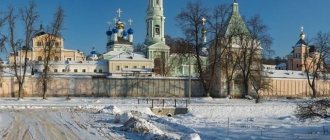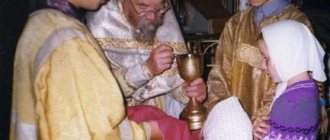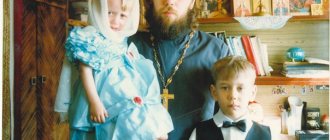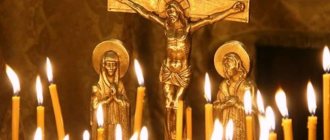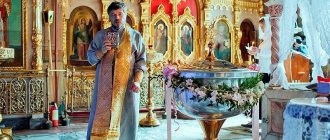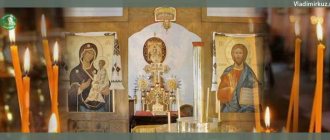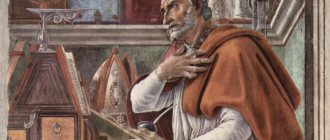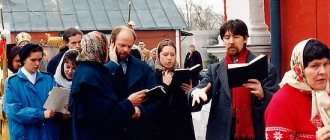How Father German reprimands in Sergiev Posad - reviews from believers
The church rite of exorcism from the possessed is performed not far from Moscow on the territory of the monastery of the Holy Trinity St. Sergius Lavra. Archimandrite German (Chesnokov) carries out a mass lecture according to the most ancient canons.
Believers who attended the service talk about the strong impression they received from the ceremony. The feeling of belonging to the divine arises upon entering the gate temple and intensifies during the speech of the clergyman.
The reprimand is preceded by Father Herman's sermon, guiding the believers and penetrating deep into the soul. This is followed by an unusually long special prayer, accompanied by the unnatural muttering and howling of the possessed.
Ordinary people watch with fear how the unclean spirit manifests itself in those possessed by demons. Sprinkling with holy water causes disgusting convulsions in the possessed, animal sounds burst out of their mouths, and people take on terrible forms.
After visiting the lecture three times, believers notice noticeable changes in their daily lives. For some, the ceremony helped in their personal lives; for others, their loved ones were cured of addictions and became kinder and calmer.
From the following article you will learn about the life and work of Hieromonk Photius.
PORTAL CONTACTS
This year, several inhabitants of the Trinity-Sergius Lavra went to the Lord at once. Among them are wonderful confessors - Archimandrite Lavrenty (Postnikov), Schema-Archimandrite Nikon (Deev), Archimandrite Ilian (Plemenyuk) ... We asked Metropolitan Longin of Saratov and Volsk, who headed the Moscow metochion of the Trinity-Sergius Lavra in 1992-2003, to talk about the deceased brethren and about what spiritual lessons we could learn from the difficult situation of recent months.
– Vladyka, when did you, a native of Abkhazia, first learn about the Trinity-Sergius Lavra?
– I spent my youth between two cities: Sukhumi, my hometown, where my mother and I lived, and Moscow, where my grandmother lived and where I came every summer. Grandmother was a believer. One day she brought me, a teenager, to the Trinity-Sergius Lavra. That's how I learned about its existence. If people of my generation came to Church, it was mainly thanks to their believing grandmothers.
I grew up like an ordinary young man, graduated from the evening department of the university, and worked. But over time, I became obsessed with the idea of becoming a priest. After serving in the army after graduating from high school, I entered the Moscow Theological Seminary. It was not very easy, but the Lord arranged it in such a way that I succeeded.
I was accepted straight into the second year (back then it was called a “class”). I began to live at the seminary and at the same time saw up close the life of the Trinity-Sergius Lavra. It captivated me so much, it turned out to be so in tune with my own moods and desires, that a year after entering I submitted an application to join the Lavra brethren.
– Why did you become acquainted with monastic life in the Trinity-Sergius Lavra, and not near you - in Sukhumi or the mountains of Abkhazia, where at that time the Glinsky elders, now glorified as saints, labored?
“In those days, I was still a schoolboy and was just starting to go to church at home. Yes, I saw Father Seraphim (Romantsov). He sometimes came to the Sukhumi Cathedral and confessed to the people - perhaps I confessed to him too. I absolutely remember that I found myself in the church exactly when Metropolitan Elijah (later His Holiness Patriarch-Catholicos of Georgia - Ed.) was performing his funeral service. I was 13 or 14 years old, I was neither a subdeacon nor a sexton, so I did not have any close contact with the clergy. At the same time, of course, everyone who went to church knew about the hermits. Among them were not only famous ascetics, but also the simplest servants of God. Some lived far away in the mountains, others closer - in or near local Greek or Armenian villages. There were quite a lot of hermits, but due to my age I did not communicate closely with any of them.
– So, it was the Lavra that opened the world of monasticism to you?
– Yes, I became acquainted with monasticism at the Lavra. The monastery of St. Sergius at that time was a very interesting, spiritually rich place. Real monks lived there. This is Father Kirill (Pavlov), and Father Naum (Bayborodin), and other elders.
– Which of the Lavra fathers did you become close to during your studies? Maybe someone went to confession more often, for advice?
– I almost always confessed to Father Kirill. He received me from my tonsure. Subsequently, when the priest became weak and it became difficult to get to him in Peredelkino, I was confessed by Father Nikodim (Deev), in the Nikon schema, who had recently departed to the Lord. I also confessed to Elder Schema-Archimandrite Michael.
I knew them both when I lived in the Lavra and when I headed the Lavra courtyard in Moscow, because as a member of the Spiritual Council I came to the Lavra quite often. Our courtyard in general was a real outpost of the monastery of St. Sergius in Moscow: the Lavra brethren served, worked, and stayed with us.
Returning to the conversation about the Lavra inhabitants of that time, it is impossible not to talk about Father Matthew (Mormyl). He and the choir he founded are what won my heart and until my death will be the greatest impression and most important memory of that old Lavra. Father Matthew is a man-universe of inexhaustible depth.
He has already gone down in Russian history as the main successor of the traditions of national musical culture. Father Matthew is an incredible talent, a deep man, and an absolutely wonderful monk.
– Who blessed you to become a monk?
- Father Kirill. I came to him and he blessed. It was 1986. At that time, many seminarians were tonsured at the Lavra - several dozen people a year. We lived in the USSR, and no one suspected that after a while he would be gone. There were no hopes of what happened later, that the Church would become free, but, nevertheless, a lot of people entered the seminary, there was quite a big competition (however, there were few seminaries in the entire Soviet Union, only three).
– How do you remember Father Kirill?
– For me, Father Kirill has forever remained an example of an extremely delicate confessor who never imposed his point of view on anyone, but always tried to find out as fully as possible what the person himself is striving for, what his thoughts are directed towards, what he is thinking about. Father Kirill tried to support in a person the will that he considered good, and never forced anyone’s will.
And, of course, Father Kirill was precisely a gracious old man. He was one of those people, seeing whom one could be confident in the truth of the path we are following, in the truth of spiritual life, because he without words showed the image of a God-enlightened person.
– How long did you stay within the walls of the Lavra?
– After graduating from the seminary, I entered the academy and was sent to study abroad, to the Theological Academy of the then Bulgarian People's Republic. Two years after the fall of communism in Eastern Europe, the academy again became the Theological Faculty of Sofia University, from which I graduated in 1992.
I returned back to the Lavra, and a few months later I was sent to Moscow to restore the Lavra courtyard, which simply did not exist then. It consisted of several scattered buildings. The temple and the Metropolitan House were occupied by various organizations and institutions. And then for 11 years I was rector of the metochion of the Trinity-Sergius Lavra, restored it, established monastic and parish life in it. By 2003, a small monastery of 18 people had formed there.
– You mentioned the recently deceased Father Nicodemus, in the schema – Nikon (Deev). Tell us about it.
– Father Nikodim was very modest. He lived all his life in Lavra. I don’t even know how many decades he served as a preacher and confessor in the Church of the Baptist. An ordinary Lavra monk, who spent his whole life communicating with the people, confessed, preached, answered questions and did what the Lord spoke about through the mouth of the prophet Isaiah: “Comfort, comfort My people” (Is. 40: 1). Father Nikon was meek, humble, kind - and that is how he remains in my memory.
– This year, in addition to Schema-Archimandrite Nikon, several Lavra old-timers went to the Lord at once: these are Fathers Lavrenty, Ilian, Raphael, Tikhon... Did you communicate with any of them?
“These were all monks, so to speak, without fear or reproach.
I knew Father Spiridon well, and in the schema - Schema-Archimandrite Raphael. We arrived almost at the same time - he joined the Lavra brethren a year or two before me. We communicated all this time. Father Spiridon was the steward of the Lavra and carried out other obediences. Since he was transferred to the Donskoy Monastery, we have met less often.
But without whom it is now very difficult to imagine the Lavra, it is Archimandrite Lavrenty (Postnikov).
He was a very integral, persistent, firm person from among those who took himself, his obedience and his monasticism unusually seriously. Father Lavrenty did not allow himself to relax in any way. I always went to the fraternal prayer service - it just never happened that he wasn’t there. His many years of obedience was to lead the folk choir, which sang at early liturgies. He didn’t have a single free minute at all - he was always doing something. Not just any personal time - there wasn’t even such a moment of light: he was so immersed in the life and work of the Lavra monk.
The same exemplary monk as Father Lawrence was Father Ilian (Plemenyuk), who was distinguished by his extraordinary silence and gentleness. You could live next to him for several years and not hear anything except greetings - the priest did not conduct any conversations or negotiations. He simply lived and fulfilled his obedience.
In general, there were very good monks in the Lavra. Now, having lived in other places and looked at many things, I can say that the Lavra of that time - at the turn of the 1980s - early 1990s - consisted of real, devoted to God and very deep people. And I can only repeat the words of St. Macarius the Great: “I am not a monk, but I have seen monks.”
– Do you think that after the departure to the Lord first of Fathers Cyril, Nahum and Matthew, and then, this year, Lawrence, Nikon, Ilian, Raphael, will the continuity of spiritual and monastic experience be preserved in the Lavra?
- It will be preserved. I am absolutely convinced of this. And for this reason: the main educator in the Lavra is St. Sergius himself. If people, living in the Lavra, have the feeling for him that we all have for him, then the Reverend educates, probably more than anyone else.
And the example of these ascetics was probably reflected in the hearts of those who are younger and now live in the Lavra. Such wonderful human and monastic qualities, such spiritual experience - all this cannot disappear into the sand, it will certainly remain in the hearts of the people who lived next to them. And I think that in the Lavra there are still quite a lot of good, experienced brothers who continue the service characteristic of this monastery. Of course, as a human being, I feel sorry for the elders, but the Lord Himself knows who and when to call to Himself.
– It’s no secret that some of these fathers died from coronavirus infection. On the Internet I came across many angry comments on the topic of why our God did not save His own from the epidemic...
– Yes, those of our brothers who once said in a passion that the epidemic would not affect us were, of course, wrong. We - the clergy, the monastics - are also dying. And what difference does it make whether these fathers died from an epidemic, oncology or other diseases?.. Perhaps this epidemic hastened their death, but some of them were bedridden patients for a long time - the same Father Rafail and Father Nikon. They appeared before the Lord, to whom they had been striving all their lives.
We do not claim that the epidemic bypasses us - believers are also mortal. The point is different: some people, the same authors of malicious comments, do not understand and do not want to understand what the faith of Christ is. Not knowing it and not being able to understand it, they begin to invent some kind of caricatures, which they then actively fight against.
– Do you think the epidemic situation has forced people to switch from thinking about how to get comfortable in this life to thinking about death?
- I think yes. In fact, we all know that we will die, but we have become so adept at not letting the very thought of death sink into us that we immediately switch to something else, forgetting about our own mortality. The current situation, I think, should influence many, should force them to reassess values that previously seemed unshakable, including remembering that a person can die at any minute.
Moreover, this also devalues the consciousness around the church, which anticipates the end of the world and apocalyptic horrors, since for each of us the personal end of the world can happen at any minute - for me, and for you, and for absolutely everyone. And “what I find you in,” says the Lord, “is what I judge.” This is probably the thought that should settle in our heads and hearts.
– The situation with churches closed to the laity has revealed the problem that many of us do not have the skills of real prayer. When you come to church, its entire atmosphere - worship, icons, singing - sets you up for prayer. And when you come home, there are children, work, household chores. As a result, prayer, exceeding the morning and evening rules, turns out to be such a feat that you understand: yes, you are not at all who you think you are.
– Here I would say that the temple exists for the purpose of coming there to pray. It is not for nothing that home prayer is also called “cell prayer” (this is a word from monastic usage). Home prayer is, of course, necessary. But its measure cannot be great for people living an ordinary life.
Well, what kind of cell prayer can there be now if you have two or three children who are studying remotely, the whole family is sitting at home, sometimes grandparents are nearby, and all this is in a not very large apartment, and it’s already the second or third month quarantine! I would not especially reproach ordinary people for not praying enough. God willing, if they read morning and evening prayers, and if they also add a chapter from the Holy Scriptures, then all honor and praise to them.
Of course, the skill of praying at home yourself is a wonderful skill. Recently, many observances have been published - both Holy Week, Easter Week, and holidays - which you can easily learn to perform at home, if conditions permit.
But, I repeat, the temple exists precisely for public prayer: “Where two or three are gathered in My name, there I am in the midst of them” (Matthew 18:20). And this should always be kept in mind.
– What other lessons can we, Christians, learn from the situation with the closure of churches?
– There are several lessons that can be learned.
I think that all the priests, for whom their occupation is not earnings, but service, in a kind, special way felt their inextricable connection with the people. And this connection should only strengthen in the future, and the element of alienation that sometimes creeps in on the part of the clergy must be overcome.
We all need to remember a good saying: “What we have, we don’t keep; when we lose, we cry.” How do we often approach worship? “Yes, and thank God, I don’t have to go today. Anyone who needs it can go and pray.”
I often observe the same picture: a church was opened in the village (and it doesn’t matter whether it was built from scratch, restored, or some kind of room adapted for a church); The diocese, philanthropists, and local residents worked together. The bishop arrives to consecrate the temple. There are 100–150 people at the first service and procession. A week, two, a month passes. The priest serves regularly, and there are already about 50 people, then 40, and in the end there are only 15–20 people left. You ask: “Why don’t you go to church?” - “Well, we were there for Easter.” And for sure: the service is going on - and it’s good, everything is in order, but “we have a garden”, “we have a cow”, “the grandchildren have arrived.” This is the common people’s feeling that since there is a church, even if the priest prays there, we will also go into it someday, when necessary.
I think that now all truly believing churchgoers who have appreciated what the Sacraments and divine services mean in their lives should experience a renewal of these feelings.
– The situation in cities is a little different. We are so accustomed (I judge from Moscow) to the fact that there are many churches that sometimes we begin to select priests almost by the color of their beard...
- Well, yes, one temple is better than another: here the priest is good, and there is even better, here they sing in Byzantine, there - in everyday life, here they serve for a long time, there they serve faster. The choice is like at a fair... We got a little stuffed. There is such a characteristic human quality. So the Lord slightly shortens us, stops us.
Over the past 30 years, we have become accustomed to living in a favorable regime - if not complete, then very large. I looked at how Orthodox Christians live in Ukraine, and it always seemed to me that sooner or later this would come to us.
What just happened is extremely unpleasant. It turned out that many, including government officials, treat the Church and faith as something of secondary importance, which can be done without and which is not even worth talking about to serious people. But the Lord does nothing by chance, and we must see in this situation the hand of God and God’s reminder and not forget about those who served God in much more difficult and difficult conditions than we find ourselves in today.
– Yes, most of those fathers we talked about today lived a very hard life, but they did not lose heart and shone with another reflected light of Christ.
- Exactly. They lived in a state that set as its goal not the temporary closure of churches, but the complete destruction of religion. That state persecuted, banned, and mocked believers and especially clergy. These devotees lived in a cage - let me remind you, on the Lavra there was an inscription: “Museum-Reserve” - and the authorities tolerated the monastery only because it was necessary to demonstrate “freedom of conscience” to visiting foreigners in the Soviet Union.
And despite all this, the Lavra fathers were happy.
They lived at the relics of St. Sergius. They prayed. They tried to fulfill their monastic vows - and fulfilled them. These are heroes to be remembered and emulated. Pravoslavie.ru
Biography of Father German Chesnokov
Archimandrite German, in the world Alexander, (Chesnokov) was born on August 30, 1941. His entire life is devoted to boundless service to God and activities in the fight against unclean spirits. He strives to introduce the faith and cleanse the souls of the Orthodox from demonic influence.
The biography of Alexander Chesnokov includes military service, admission to the Moscow Automobile and Road Institute, and gradual unity with God. After graduating from the theological academy, Father German becomes a novice of the Lavra, and then a monk of the Trinity-Sergius Monastery.
What is known about his worldly life?
Ryabtsev was a born musician. From the age of thirteen he performed on the professional stage. Vocal and instrumental ensembles held dance evenings in the city parks of Dnepropetrovsk. It was there that Gennady Ryabtsev demonstrated his musical abilities.
The guy lived in the Ukrainian city for 22 years. A chance meeting changed everything when he met the brother of Vladimir Kuzmin. In 1983, Ryabtsev went to Moscow, where he was invited to join the “Dynamic” group. The guy sang and played several musical instruments. The joint activity lasted four years.
In 1987, Gennady was invited to Yuri Antonov’s group. By that time, he had recorded a solo album, “Date.” A year later, Ryabtsev became a member of the Mosconcert touring troupe. The talented musician gives solo concerts, performs with famous singers, and prepares album recordings.
The artist’s creativity is confidently going uphill. His performance is awaited by the audience, who warmly welcome the musician. But at the beginning of 1989, Gennady Ryabtsev disappeared from the stage, thereby leaving fans and colleagues in complete bewilderment.
Schedule of lectures in Sergiev Posad
You can attend the lecture of Archimandrite Herman by visiting the Holy Trinity Monastery of Sergiev Posad. The rite of reprimanding the possessed is not carried out on the twelfth holidays, the most important holidays in Orthodoxy.
The location of the ceremony every Friday, Saturday and Sunday is the Church of the Holy Apostles Peter and Paul. The rite of exorcism of unclean spirits begins at 12:00.
Reception hours can be confirmed by phone.
